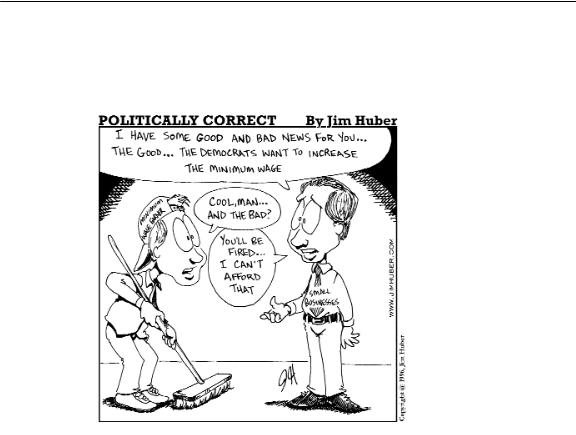
- •Acknowledgements
- •Table of Contents
- •Introduction
- •Validity Continued
- •Still More on Validity
- •Deduction Extended
- •Deduction Further Extended
- •Economics vs. Mathematics
- •Action
- •More About Action
- •Preference and Utility
- •Utility and Welfare
- •The Highest Valued Goal
- •The Tautology Objection
- •The Tautology Objection Answered
- •The Tautology Objection Considered Further
- •Marginal Utility
- •The Indifference Objection
- •More on Indifference
- •Demonstrated Preference Once More
- •The Basis of Marginal Utility
- •An Objection Answered
- •The Relevant Unit
- •Extension of Marginal Utility
- •Two Kinds of Exchange
- •Mutual Benefit from Trade
- •Law of Demand
- •Why There is no Contradiction
- •Demand and Supply Curves Revisited
- •Extra-Credit Section
- •Another Economics?
- •The Marxist ABCs
- •Why Marx is Not a Subjectivist
- •More Marxist Mistakes
- •Another Fallacy
- •A Final Anomaly
- •What Good is Economics?
- •A Basic Rule of Economics
- •Marginal Buyers and Sellers
- •Enter the Villain
- •Yet Another Complication
- •And Another Complication
- •The Ethical Point
- •Ethics Continued
- •Even More Ethics
- •Much Ado About Very Little?
- •Why We Are Not Home Free
- •Have We Painted Ourselves into a Corner?
- •Ludwig von Mises to the Rescue
- •A Digression on Equality
- •More on Equality
- •A Poorly-Chosen Example
- •Back to Economics
- •The Mystery Unveiled
- •Exceptions
- •An Exception
- •The Minimum Wage Rule
- •Ethics
- •Mises to the Rescue Again
- •A Commonly Missed Point
- •Labor Unions
- •The Origin of Money
- •More on Exchange
- •Indirect Exchange
- •Indirect Exchange Continued
- •Limits of Indirect Exchange
- •The Problem of Indirect Exchange Compounded
- •Toward a Solution
- •Is Our Solution a Pseudo-Solution?
- •How a Medium of Exchange Arises
- •Convergence
- •Praxeology and Convergence
- •Money and Banking
- •Convergence Once More
- •Properties of a Medium of Exchange
- •Money as a Store of Value
- •The Money Regression Theorem
- •Mises on Money Regression
- •At Last We Get to Mises
- •Has Mises Solved His Problem?
- •An Unusual Choice
- •The Usual Choice
- •The Market Solution
- •Other Goods
- •The Sap Gets Wise
- •Enter the State
- •Digression on Ethics
- •Surpluses and Shortages
- •A Single Metal Standard
- •Conclusion
- •Glossary
- •About the Author

Chapter 7: Minimum Wages and Wage Control 123
Which ones? Obviously, those who found the value of stiltwalkers just slightly higher than $10.00. Faced with the requirement that they pay $12.00 per hour, they will no longer find it worth their while to do so. These marginal buyers will bid the stiltwalkers a swift farewell.
What then, is the upshot? At the new price, $12.00 per hour, more workers are willing to work than at the $10.00 per hour price. But fewer employers wish to purchase labor at this price. Supply and demand no longer balance. Put another way, minimum wage laws cause unemployment.
1.Extra-credit. Both here and in the previous chapter, We’ve spoken of “marginal” buyers or sellers. These are people who “just barely” find a transaction worth making at the market price and will be driven out of the market should the price change in a way unfavorable to them. Is the use of this concept consistent with the Austrian claim that preference is ordinal and cannot be measured?
?
EXCEPTIONS
We can come up with a few exceptional cases in which minimum wage laws do not cause unemployment. Suppose that stiltwalkers earn $10.00 per hour, and the minimum wage is $5.00. It is safe to predict that this minimum wage regulation will have little effect on unemployment.
1. |
Draw a demand and supply curve for stilt-walkers, with |
? |
|
$10.00 as the market wage. Show how a minimum wage |
|
|
of $5.00 will leave price determination untouched. |

124 An Introduction to Economic Reasoning
AN EXCEPTION
Or will it? As you might have already guessed, there’s an exception. The market for workers is affected not only by the prevailing wage rate, but by expectations about future wages. If an employer thinks that the market wage for stilt-walkers will soon fall to $3.00, he will make plans accordingly. If the minimum wage interferes with his plans, his demand schedule will alter.
? |
1. |
Show why the exception isn’t really an exception. (Hint: |
|
the minimum wage will have an impact on future demand.) |
|
2. |
What about a minimum wage rate so low it has no effect |
on either present or expected wages?
THE MINIMUM WAGE RULE
In general, then, we can say: a minimum wage will either be useless or will cause unemployment. Once again, there is another exception: the minimum wage “justifies” itself by changing preference schedules so that the minimum wage becomes the market wage. But why should this happen?
ETHICS
No, I can’t stay away from philosophy for long; but, as we have already covered the essentials, we can be brief. The minimum wage rule does not by itself suffice to show that minimum wages are bad. It is a descriptive, not a normative claim.

Chapter 7: Minimum Wages and Wage Control 125
Further, to justify a negative verdict on minimum wage legislation, it is not enough just to add the non-controversial value-judgment, “unemployment is bad.” A supporter of minimum wages could claim that the increased wages for some workers outweighs the unemployment of others.
MISES TO THE RESCUE AGAIN
Once more, Ludwig von Mises offers a way out. Advocates of minimum wages do not characteristically claim that the advantages of higher wages for some justify unemployment for others. Rather, they claim that minimum wage legislation will increase wages without causing unemployment. And this economic theory shows to be false. (If this chapter sounds like a repetition of the last chapter, you have learned your lessons well. If it doesn’t, please reread the previous chapter.)

126 An Introduction to Economic Reasoning
1.“We’re talking about human lives here! The economic principles that determine the price of ordinary goods and services don’t apply to human labor.” Evaluate.
?2. Without minimum wages, employers would be free to pay “starvation wages.” Evaluate.
3.Why are minimum wages usually quite low? Why not a $20.00 per hour minimum wage?
THE ZONE OF INDETERMINACY
Some labor economists will say that the foregoing analysis is crude and oversimplified. (They would say that, wouldn’t they?) We have assumed that the free market fixes wages at a certain point: above or below this point, there will be either shortage or surplus.
But why assume this? Perhaps wages are fixed by the market in a zone, rather than at a point. Suppose that the market wage of stilt-walkers is $10.00 per hour. A minimum wage now requires that stilt-walkers be paid $12.00 per hour.
Must unemployment result? Not necessarily. Suppose employers demand exactly the same number of stilt-walkers at $12.00 as at $10.00; and workers prove no more likely to practice “nonsense on stilts” than at the higher price. In other words, neither demand nor supply respond very much to small shifts in price. If so, the minimum wage will not cause unemployment.
Supporters of this view have not offered much evidence in its defense. Why assume that the labor market operates differently from other markets? We don’t usually talk about zones of indeterminacy in the price of wheat—or, for that matter, of stilts. Why stilt-walkers?
